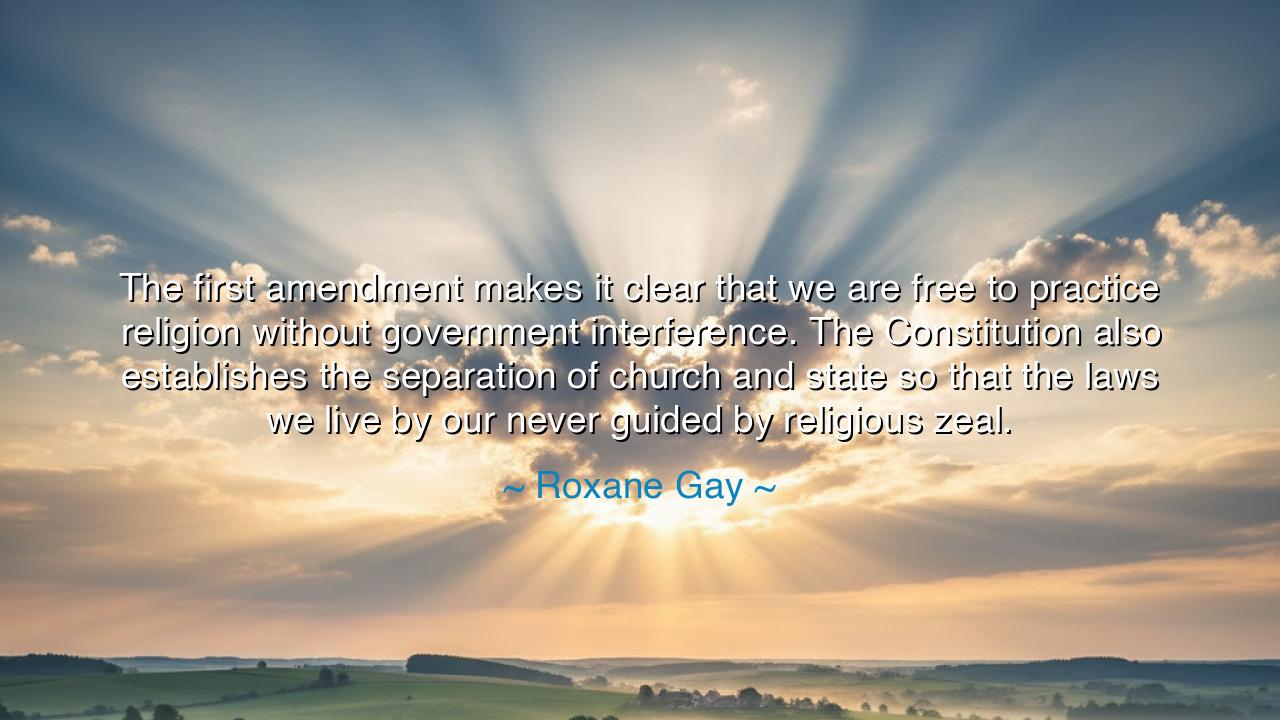
The first amendment makes it clear that we are free to practice
The first amendment makes it clear that we are free to practice religion without government interference. The Constitution also establishes the separation of church and state so that the laws we live by our never guided by religious zeal.






In the age of liberty and tumult, when nations still wrestled with the sacred balance between faith and freedom, the writer and thinker Roxane Gay spoke words of enduring clarity:
"The First Amendment makes it clear that we are free to practice religion without government interference. The Constitution also establishes the separation of church and state so that the laws we live by are never guided by religious zeal."
These words, though born of modern struggle, echo the wisdom of the ancients — that power and piety, when intertwined, often birth oppression. Gay’s voice is both reminder and warning, a call to preserve the fragile covenant of freedom of belief, and to guard the realm of law from the consuming fire of religious zeal. For history, that stern teacher, has shown again and again: when faith commands the sword of government, both faith and freedom perish together.
In her invocation of the First Amendment, Gay speaks to the living heart of democracy — that no soul shall be coerced in worship, and no creed shall be enthroned as the law of the land. The framers of the Constitution, wise from the tyranny of kings and the persecutions of empires, carved these words like holy script into the foundation of the republic. They remembered the fires of Europe — when men and women burned for praying in the wrong tongue, or for daring to think that God’s voice might sound different in another’s ear. Out of those ashes rose a conviction: that true belief can only live in freedom.
The separation of church and state was not written to weaken religion, but to protect it — to keep the sanctuary pure from the corruption of politics, and the state safe from the absolutism of the pulpit. For the state governs bodies, but religion seeks to shape souls; when one rules the other, both are diminished. Gay’s words remind us that this balance is no relic of parchment, but a living defense against tyranny in new forms — whether from those who seek to sanctify their power, or those who would legislate their creed.
Recall the story of Roger Williams, the founder of Rhode Island, who fled the rigid theocracy of the Massachusetts Bay Colony. He, too, declared that “forced worship stinks in the nostrils of God.” Exiled for this belief, he built a new land where no man’s conscience would be ruled by another’s faith. It was Williams, and those like him, whose vision would later shape the soul of the First Amendment — a realm where belief is free, and the government neither blesses nor curses the creeds of its people. His courage laid the cornerstone of the freedom Gay defends today.
But the battle she names is far from over. In every generation, zeal returns wearing new faces. Some cry that the state must enforce their vision of virtue; others whisper that morality itself cannot stand without their faith at the helm. Yet the truth, eternal and unyielding, is this: when the law bows to religion, religion becomes lawless. When the pulpit wields the sword, both justice and holiness are stained with blood. Gay’s warning, though modern in its language, is ancient in its wisdom — a reminder that liberty must be guarded not just from tyrants, but from believers who forget the humility of belief.
There is grandeur in her message — for it speaks not against faith, but against domination. She affirms that religion, like art or thought, must dwell in the realm of freedom to retain its soul. The Constitution, in this vision, is not the enemy of God, but the shield of conscience. It protects the Christian and the atheist, the Muslim and the Jew, the seeker and the skeptic alike — each free to worship, or not, beneath the same sky. This equality before the law is the purest expression of peace: a harmony of difference, not a silence of fear.
Let the listener therefore remember: the power of faith lies in persuasion, not coercion; its light shines brightest when unforced. The First Amendment is not merely law — it is the covenant of a people who understood that truth needs no chains, and that holiness, if real, fears no freedom. A government that kneels to no altar allows all altars to stand unharmed.
So take this teaching to heart, O child of a divided age: honor your faith, but never let it rule your neighbor. Defend your convictions, but never seek to make them law. Live as the founders dreamed and as Roxane Gay reminds — in a nation where belief is sacred because it is chosen, and where law is just because it belongs to all.
Thus ends the teaching: the wall between church and state is not a barrier of hostility, but a fortress of freedom. Guard it well, for upon it stands the soul of liberty.






AAdministratorAdministrator
Welcome, honored guests. Please leave a comment, we will respond soon